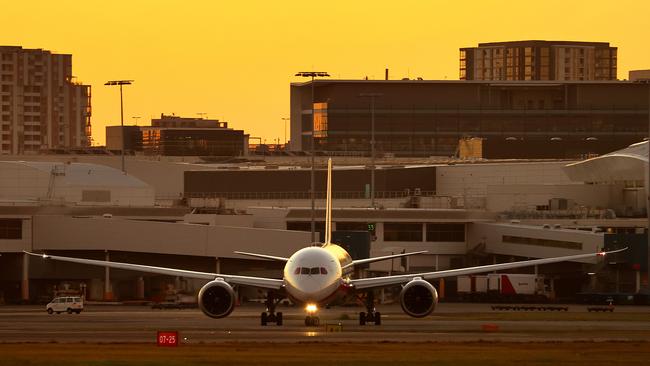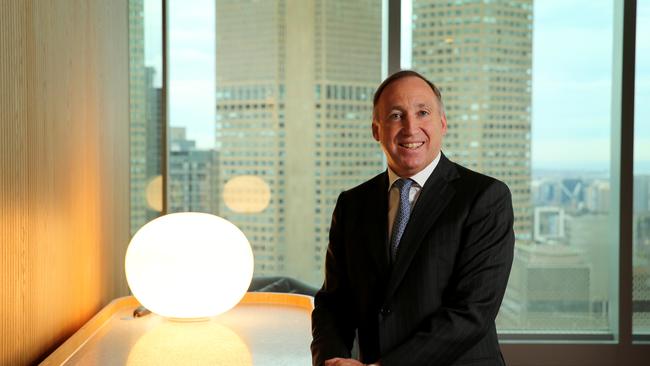
Tabcorp stretched the definition to throw its lottery and keno demerger into the pool, but if the definition was annuity-style earnings then the lottery business goes close.
The market was disappointed the company didn’t accept the circa $4bn bids for its wagering and other assets and instead kicked the can down the road with a plan on giving shareholders a stake on both.
In ballpark terms Tabcorp’s equity value on Monday was $11.6bn but lotteries and keno on their own are worth around $11bn and bids are on the table for wagering at $4bn, so the volume uplift is clear.
Sydney Airport faces a prolonged period with minimum earnings, with the international borders unlikely to be open until at least this time next year, but IFM has seen past the gloom and put real money on the table.
The bid at $8.25 a share compares with a high for the stock of $8.98 at the end of 2019, pre-Covid, and a mammoth raising of 20 per cent of capital at $4.56 a share last year.
The IFM bid is superbly timed and the issue now is whether it shakes out local or international rival bids, with the latter subject to shareholder limits of 49 per cent and so needing a local partner.
IFM member and 25 per cent owner AustralianSuper also owns 25.2 per cent of Melbourne Airport, 20 per cent of Brisbane and stakes in three other airports, including the infamous 3.3 per cent of Perth Airport. There are limits on owning more than one of the east coast airports, but given IFM is leading a consortium, that won’t be breached.
Unisuper, which is a second cousin of sorts to the industry funds, holds the key with its 15 per cent stake in Sydney, so the call by its investment manager John Pearce will be crucial.
Its early days yet but the deal flow continues as asset managers look for value in a market where interest rates are at record lows and the time is right to chase Covid recovery plays.
Goldman is advising IFM on the deal, with Sydney Airport chaired by David Gonski and advised by Barrenjoey (which Gonski also chairs) and UBS.
–
Qube sale closes
Qube is trading ahead of a hefty share buyback after closing the $1.7bn sale of its famed Moorebank intermodal facility to the LOGOS consortium for about $900m profit over a 17-year investment. The deal is a boon to new boss Paul Digney who took over from Maurice James last week, and some 17 years since former boss Chris Corrigan approached the then Prime Minister John Howard about buying the land to establish the centre.
Along the way one-time partners including Aurizon and Stockland dropped off, leaving James to push through on the project, which is still subject to some last-minute refinements on planning approvals and FIRB approval.
In today’s ESG terms the project is a winner, located on a rail line from Port Botany and the Melbourne to Brisbane train line, with the potential to clear 1.5 million containers, removing the need for 2000 trucks and reducing daily truck traffic by 150,000km a day and interstate trucking by 93,000km.
From ship to warehouse the goods are handled by robots.
AustralianSuper likes the asset. After a $774m investment it will own 25 per cent in a deal which also includes AXA, TCorp and Ivanhoe Cambridge, led by LOGOS Australian boss Darren Searle, who comes to the table from a logistics background, including time with Toll.
Qube had invested $300m in land and $500m on the park, which now has key tenants including Woolworths, Caesarstone and Target.
Qube will be running the open access terminal, which links with its half-owned Patrick container terminal and now returns to being a pure play logistics company.
–
Many happy returns
AustralianSuper’s investment chief Mark Delaney has warned fund returns will be lower this year after last year’s record return of 20.4 per cent, but described himself as “reasonably optimistic”.
The 15-year-old fund has returned strong 9.6 per cent returns over three years, 10.4 per cent over five and 9.7 per cent over 10 years.
Delaney said he would be “very pleased to get as much as 10 per cent this year”, adding “equities are still the place to be”.

In terms of stock selection, he said the cyclical bias would remain for a while and low interest rate stocks like utilities would do better, along with banks.
Ahead of Tuesday’s RBA meeting, which is expected to start undoing the easy credit of the last 18 months, Delaney said: “The RBA has said it will keep rates on hold for two years but I think that will be difficult to do.
“Rates will go higher.”
Delaney said people tended to look backwards, which was a terrible way to invest.
This time a year ago Covid was a “considerable uncertainty”.
“People get so pessimistic they fail to see the recovery, and the stimulus was bigger than expected,” he said.
Delaney said the three big themes governing markets were digitisation, climate change and a deterioration in geopolitics.
The latter means China and Delaney noted it would have been “more helpful if the government was more considered in what it says to China … but China has put other countries in the freezer before and taken them out”.
It is clearly a big impact for Australian companies because they won’t be able to directly benefit from China’s growth.
“We will have to do more to diversify export markets,” he added.
Digitisation, he said, was like electricity: its influence spreads and now drives everything.
He noted Australia would benefit from the fact Zoom et al have shown the world is not such a big place.
AustralianSuper has just made its biggest industrial property investment, spending $774m to buy a 25 per cent stake in the $1.7bn LOGOS takeover of the Qube Moorebank intermodal warehouse park.
The $225bn fund benefits from $1.7bn in new cash every month. This helps diversify its holdings, which are now weighted 58 per cent into equities, with foreign stocks at 23 per cent, infrastructure 12 per cent, fixed income 6 per cent, cash 8 per cent and private equity 4.6 per cent.
In Australia Delaney aims to invest in just 25 companies and to become more effective partners with these companies. This meant it would offer capital and other support. Infrastructure was becoming more business to business and companies were keen to get assets off their balance sheet, which is where he could help.








Superannuation funds unveiled a series of deals on Monday as they opened their cheque books to bet on the Covid recovery in the hunt for long-term reliable earnings, led by the $29bn enterprise value bid for Sydney Airport led by IFM.